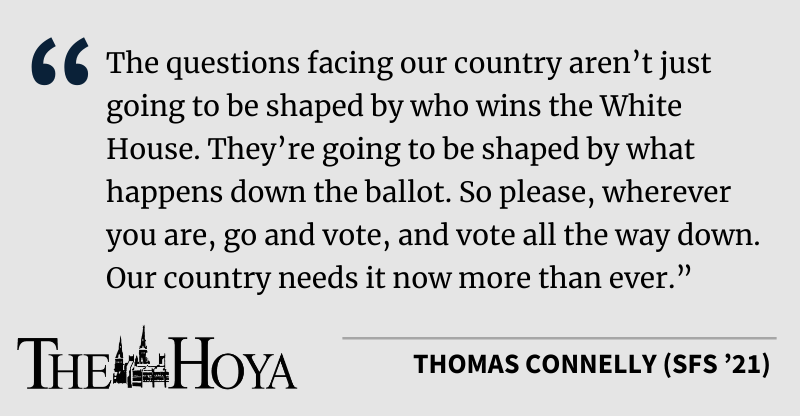Think to yourself for a moment, whether you’re a Georgetown University student or a member of our community, if you have ever heard or said something along these lines:
“Why would I vote? I’m from California. It’s going blue no matter what.”
“My vote’s useless. Kentucky’s picking Trump either way.”
“Washington, D.C., doesn’t even have representation in Congress; what’s the point in voting?”
In my time working with GU Votes, Georgetown’s student-led voting initiative, “my vote won’t count” is the single most common reasoning I have heard from students who say they don’t plan on voting. I can easily see why. Our state-by-state, winner-takes-all system makes it hard to feel like your vote makes a difference in a seemingly already decided state. But if this mindset is your approach to this election, or to any election, you’re dangerously wrong. Why? Because of one inextricable reality of our political system: Change happens everywhere. The majority of change happens not in the Oval Office nor in the Supreme Court or the Capitol, but in state legislatures and city councils across the country. You may not realize how much power these lower offices hold.
State legislatures decide how to fund their states’ education systems, infrastructure, social services and more. They choose which crimes are given which sentences, how to ensure clean drinking water, what the minimum wage should be, what background checks are required before purchasing a gun, and on and on. City councils can fund or defund police, decide on disaster relief, vote to become sanctuary cities for undocumented immigrants and even voluntarily reenter into the Paris Agreement. District attorneys and judges have immense influence over criminal justice reform, secretaries of state can expand and restrict voting rights, comptrollers can alleviate student loans and award grants to impactful businesses, and governors have the power to affect change in their states on virtually every issue.
Many of the races for these offices are excruciatingly close. In 2018, a number of races across the country were decided by pitiful numbers of votes. In a Washington Senate race, a Republican incumbent beat a challenging Democrat by 46 votes. In the Illinois House of Representatives, Republican Tom Morrison defeated Democrat Maggie Trevor by 43 votes. A Minnesota House race was decided by eight votes, and an Idaho Senate race came down to six votes. In Alaska and Kentucky, two House races were decided by literally one vote each. Yes, just one different vote at the polls on Election Day could have changed the makeup of legislative bodies deciding on critical, life-or-death issues, like racial justice, climate change and gun control. These examples just scratched the surface — there are tight races happening in every state, including in your state, for which your vote can be a deciding factor.
What’s more, many states are also deciding on contentious issues through ballot referenda, in which you can directly vote for or against important legislation. In California, Proposition 17 would restore the right to vote to people convicted of felonies who are on parole. In Massachusetts, Question 2 would implement ranked-choice voting, ensuring far more proportional representation, and, in Mississippi, Measure 1 would legalize medical marijuana in certain cases. The list goes on. Look up the propositions on the ballot in your state — in all likelihood, you have the power to decide on issues you care about that you may not have realized were up to you.
Finally, and perhaps most critically, don’t forget that state legislatures are in charge of drawing congressional district lines. The 2020 elections are particularly important in this regard because they’re the last elections before a new round of redistricting based on the results of the 2020 census. Those in office at the state level will have the power to decide what their districts look like, directly determining the makeup of the House of Representatives for the next decade. Your vote for these legislators can shape what our entire country’s government looks like for a generation — use it.
These facts mean your vote isn’t just about the president, or the House of Representatives or the Senate. Voting is about those representatives at every level of government who can fundamentally shift the way we approach the country’s most pressing issues. You can have as much of an impact in a swing state like Florida as in a non-swing state like Oregon or Idaho. The questions facing our country aren’t just going to be shaped by who wins the White House. They’re going to be shaped by what happens down the ballot. So please, wherever you are, go and vote, and vote all the way down. Our country needs it now more than ever.
CORRECTION: On October 30 2020, resources from GU Votes were added to the byline.
Thomas Connelly is a senior in the School of Foreign Service. Thomas is writing on behalf of GU Votes. Confused about the voting process? Go to bit.ly/guvotes for help and resources or email [email protected] with any questions.









